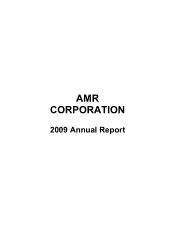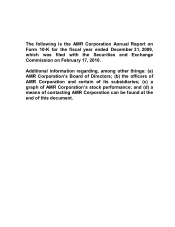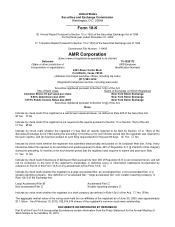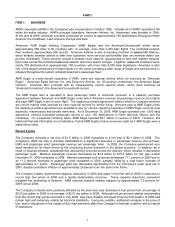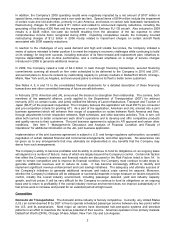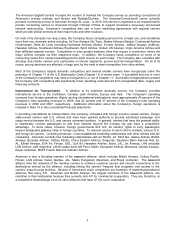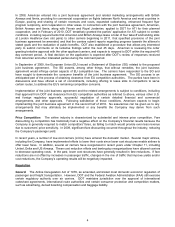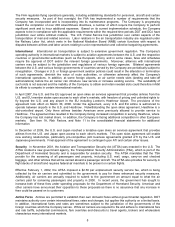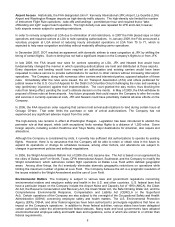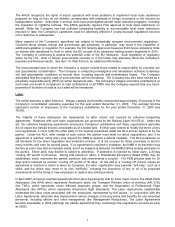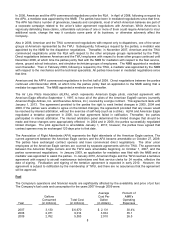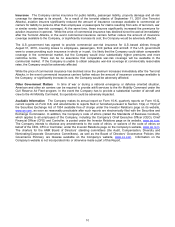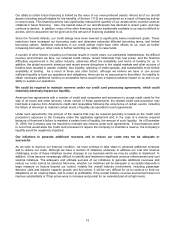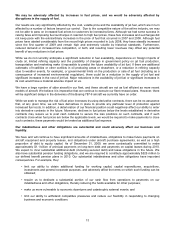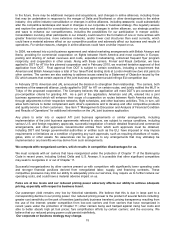American Airlines 2009 Annual Report Download - page 8
Download and view the complete annual report
Please find page 8 of the 2009 American Airlines annual report below. You can navigate through the pages in the report by either clicking on the pages listed below, or by using the keyword search tool below to find specific information within the annual report.5
The FAA regulates flying operations generally, including establishing standards for personnel, aircraft and certain
security measures. As part of that oversight, the FAA has implemented a number of requirements that the
Company has incorporated and is incorporating into its maintenance programs. The Company is progressing
toward the completion of over 200 airworthiness directives, a number of which require the Company to perform
significant work and to incur additional expenses. Based on its current implementation schedule, the Company
expects to be in compliance with the applicable requirements within the required time periods.DOT and DOJ have
jurisdiction over airline antitrust matters. The U.S. Postal Service has jurisdiction over certain aspects of the
transportation of mail and related services. Labor relations in the air transportation industry are regulated under
the Railway Labor Act, which vests in the National Mediation Board (NMB) certain functions with respect to
disputes between airlines and labor unions relating to union representation and collective bargaining agreements.
International International air transportation is subject to extensive government regulation. The Company's
operating authority in international markets is subject to aviation agreements between the U.S. and the respective
countries or governmental authorities (such as the European Union), and in some cases, fares and schedules
require the approval of DOT and/or the relevant foreign governments. Moreover, alliances with international
carriers may be subject to the jurisdiction and regulations of various foreign agencies. Bilateral agreements
between the U.S. and various foreign governments of countries served by the Company are periodically subject to
renegotiation. Changes in U.S. or foreign government aviation policies could result in the alteration or termination
of such agreements, diminish the value of route authorities, or otherwise adversely affect the Company's
international operations. In addition, at some foreign airports, an air carrier needs slots (landing and take-off
authorizations) before the air carrier can introduce new service or increase existing service. The availability of
such slots is not assured and the inability of the Company to obtain and retain needed slots could therefore inhibit
its efforts to compete in certain international markets.
In April 2007, the U.S. and the EU approved an open skies air services agreement that provides airlines from the
U.S. and EU member states open access to each other’s markets, with freedom of pricing and unlimited rights to
fly beyond the U.S. and any airport in the EU including London’s Heathrow Airport. The provisions of the
agreement took effect on March 30, 2008. Under the agreement, every U.S. and EU airline is authorized to
operate between airports in the U.S. and Heathrow. Notwithstanding the open skies agreement, Heathrow is a
slot-controlled airport. Only three airlines besides American were previously allowed to provide service to
Heathrow. The agreement has resulted in the Company facing increased competition in serving Heathrow, where
the Company has lost market share. In addition, the Company is facing additional competition in other European
markets. See Item 1A, Risk Factors, and Note 11 to the consolidated financial statements for additional
information.
In December of 2009, the U.S. and Japan reached a tentative open skies air services agreement that provides
airlines from the U.S. and Japan open access to each other’s markets. This open skies agreement will enable
new working relationships, particularly pro-competitive joint business agreements granted ATI by the U.S. and
Japanese governments. Final approval of the agreement is contingent upon ATI and certain other issues.
Security In November 2001, the Aviation and Transportation Security Act (ATSA) was enacted in the U.S. The
ATSA created a new government agency, the Transportation Security Administration (TSA), which is part of the
Department of Homeland Security and is responsible for aviation security. The ATSA mandates that the TSA
provide for the screening of all passengers and property, including U.S. mail, cargo, carry-on and checked
baggage, and other articles that will be carried aboard a passenger aircraft. The ATSA also provides for security in
flight decks of aircraft and requires federal air marshals to be present on certain flights.
Effective February 1, 2002, the ATSA imposed a $2.50 per enplanement security service fee, which is being
collected by the air carriers and submitted to the government to pay for these enhanced security measures.
Additionally, air carriers are annually required to submit to the government an amount equal to what the air
carriers paid for screening passengers and property in 2000. In recent years, the government has sought to
increase both of these fees under spending proposals for the Department of Homeland Security. American and
other carriers have announced their opposition to these proposals as there is no assurance that any increase in
fees could be passed on to customers.
Airline Fares Airlines are permitted to establish their own domestic fares without governmental regulation. DOT
maintains authority over certain international fares, rates and charges, but applies this authority on a limited basis.
In addition, international fares and rates are sometimes subject to the jurisdiction of the governments of the
foreign countries which the Company serves. While air carriers are required to file and adhere to international fare
and rate tariffs, substantial commissions, fare overrides and discounts to travel agents, brokers and wholesalers
characterize many international markets.

